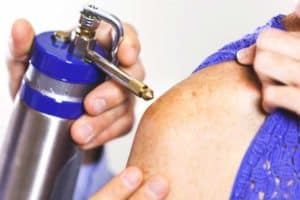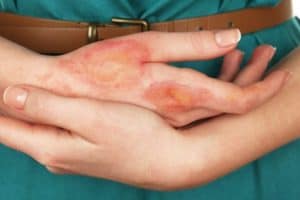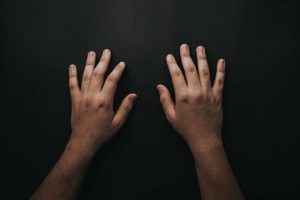If the bottom of your foot itches, there are various possible medical causes. There are also many superstitious beliefs around itchy feet. What does it mean when the bottom of your feet itches?
9 possible causes for the bottom of your feet to itch are as follows:
- Allergic contact dermatitis
- Athlete’s foot
- Dry skin
- Diabetes Mellitus/Insipidus
- Psoriasis
- Eczema
- Scabies
- Hookworm infection
- Peripheral Neuropathy
You can quickly treat dry skin, but for the rest of the causes, you will have to undergo proper treatment because some of them are chronic causes that need proper medication.
Also, there are superstitious meanings to itchy feet that may interest you. Four common itchy foot superstitions are as follows:
- Incoming travel
- Walking on new ground
- Someone is talking behind your back
- Someone is walking over your future grave
There are also itchy right foot superstitions and itchy left foot superstitions that we will discuss later.
Read on to learn more about the reason behind your itchy feet, how you can treat and prevent them, superstitious beliefs about itchy feet, and more.
Bottom of Feet Itchy Meaning – 9 Possible Medical Causes
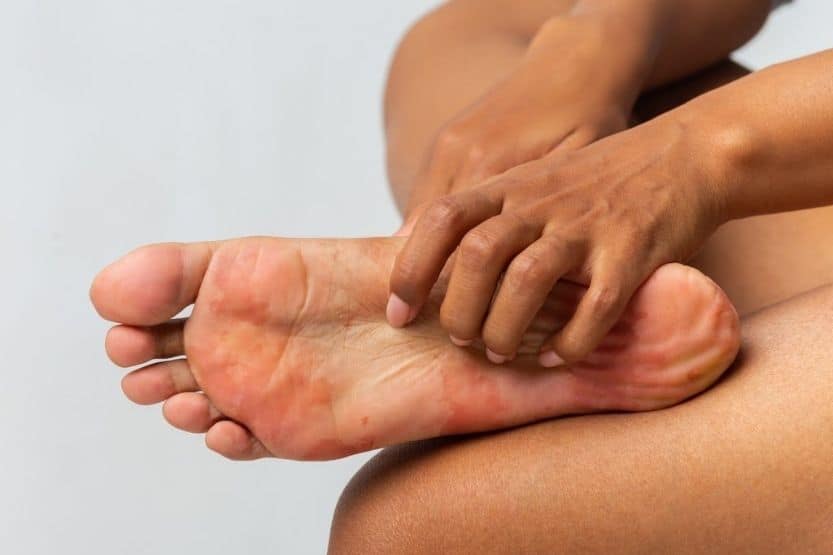
There are various reasons why the bottom of your feet itch. Below are 9 possible reasons for itchy feet and how to treat this skin issue.
1. Allergic Contact Dermatitis
Allergic Contact Dermatitis refers to the condition when your skin comes in contact with a substance that you’re allergic to. Examples of these allergens are:
- Nickel
- Poison Ivy
- Perfumes
- Soap
- Cat Dander
- Pollen
- Others
Modes of Transmission
Modes of transmission can be through skin contact (poison ivy) or inhalation (perfume and dander). Therefore, it’s a close contact transmission.
Treatment
The treatment and prevention would be to stay away from the allergen. Remove the person immediately from the vicinity, post-exposure.
In case the person came in contact with an allergen, he may develop symptoms, such as wheezing, runny nose, skin rashes, redness, and itching in different parts of the body, including the feet’s bottom.
Treatment will depend on the symptoms. For wheezing, itching, rashes, and runny nose, an antihistamine could reduce the symptoms. Examples are nasal sprays, such as fluticasone and mometasone.
The doctor may also prescribe antihistamines, such as Loratadine (Alavert, Claritin), Cetirizine (Zyrtec), and Diphenhydramine (Benadryl and Tylenol Allergy).
Prevention
If you have this condition, observe what you’re allergic to, and avoid coming in contact with them in the future.
2. Athlete’s Foot
Athlete’s foot or Tinea pedis refers to a fungal infection that can cause itchiness on the bottom of your feet and other feet parts. The foot becomes scaly, itchy, and dry rashes could appear.
Modes of Transmission
You can acquire the fungus through direct contact with a person infected with the fungi. Using an infected person’s shoes, towel, slippers, pedicure materials, or other footwear that contains the fungus could infect you.
Also, swimming pools, locker rooms, and changing areas can harbor the fungus and get you infected. [1] As long as it’s damp and the fungus is there, you can get infected.
Treatment
After washing your feet, apply antifungal cream, and use an antifungal powder when wearing your socks and shoes. You can choose among the following antifungal preparations, such as econazole, miconazole, clotrimazole, sulconazole, ketoconazole, and terbinafine.
In severe itchiness, swelling, and blisters, you have to consult a dermatologist or skin expert for proper management.
Prevention
Avoid public swimming pools and always wear slip-on in pools and damp areas. Make sure to clean your feet thoroughly with soap and water when going barefoot. Don’t share towels, footwear, blankets, or personal paraphernalia.
3. Dry Skin
Dry skin is a continuing problem for numerous people, most especially people living in high altitude areas; also, older people, who frequently wash hands or bathe because of their work (health workers and lifeguards).
The skin usually goes dry and scaly, and soon, it becomes itchy and red. Dry skin does not only affect your face but your whole body as well. Often your extremities are subjected to dry and itchy skin. The bottom of your feet can experience this too.
Mode of Transmission
There’s no mode of transmission of dry skin, as it can occur to anyone under specific circumstances without a transmission agent or vector.
Treatment
The use of skin moisturizers, lotions, and oils, such as Nivea, Olay, and Vaseline, is one easy way to treat itchy bottom feet. Likewise, learn how to hydrate yourself adequately. Drink more than eight glasses a day so that the moisture in your skin remains.
If your bottom feet’s skin gets so itchy and you start to get scratch wounds, you should consult a skin specialist for topical creams with antibiotics to prevent skin infections.
Prevention
You can prevent dry skin the same way you treat dry skin. Apply skin oils, moisturizers, and lotions. Use warm water to bath and don’t bath frequently.
Also, use only gentle soap without harsh ingredients. Avoid wetting your feet and exposing them to extreme temperatures. If you can, utilize your humidifier in your room. Lastly, your socks should be soft and comfortable.
4. Diabetes Mellitus/Insipidus
Diabetes is a metabolic disease involving the insufficiency of insulin in your body. Insulin insufficiency will cause various symptoms, including diabetic neuropathy.
In diabetic neuropathy, your body’s peripheral nerve endings, including the feet, could feel tingling, burning, numbing, or itchy sensations.
The itchy, tingling, and numbing sensations are caused by the elevated blood sugar preventing the smooth flow of blood to these nerve endings, causing the sensations.
Other symptoms of diabetes include the following:
- Hyperglycemia (elevated blood sugar),
- Polyuria (increased urination),
- Polydipsia (increased thirst), and
- Polyphagia (extreme hunger)
Modes of Transmission
Diabetes is genetically transmitted. So, if there’s a history of diabetes in your family, you should also have an annual checkup to check your blood sugar levels. Knowing your sugar levels early on will help you manage the condition earlier before it gets worse.
Treatment
There is no permanent cure for diabetes. Hence, the doctor will prescribe medication that would keep your glucose (sugar) levels in control. Blood sugar management is the key.
Examples of these drugs are Metformin and Diamicron. The medication would depend on your weight, age, lifestyle, and other illnesses you have.
Prevention
You have to consult a physician to find out if you have diabetes. Once diabetes is established, you may want to request a complete neurological examination to learn if your sugar level compromises your peripheral nerves.
5. Psoriasis
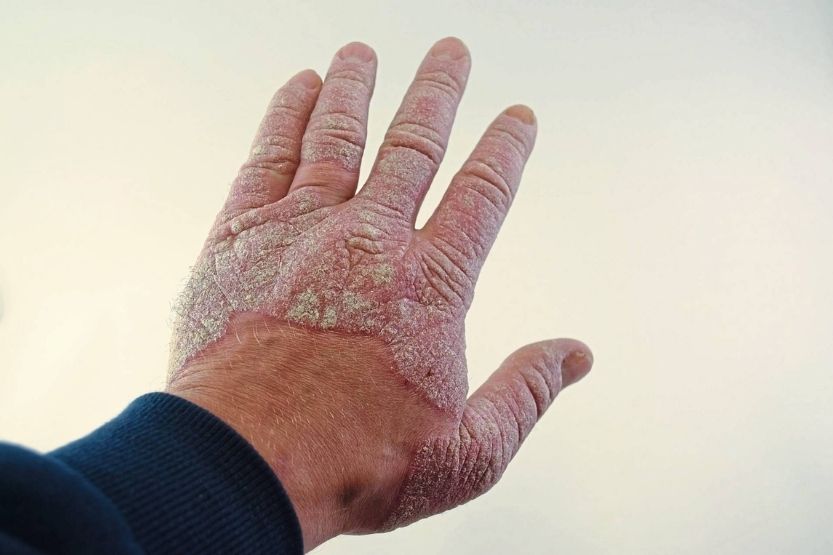
Psoriasis is a skin condition that could result in itchy, scaly, and dry skin, which can turn sore and inflamed. These symptoms can include the bottom of your feet. This condition occurs when the individual’s immune system starts attacking healthy skin cells.
Mode of Transmission
Psoriasis is not contagious. It doesn’t get transmitted from person to person. Its mode of transmission is presumed to be genetically based, although it is still not established categorically. Skin injury, throat infections, and certain medications can trigger an itchy occurrence.
Treatment
The psoriasis treatment can be topical creams or skin lotions containing salicylic acid or corticosteroids or a mixture of both.
Prevention
Prevent skin injury, infections, and medications that trigger your psoriasis. Observe what triggers it and avoid them.
6. Eczema
Eczema or atopic dermatitis demonstrates symptoms, such as dry, itchy skin, which appears in any area in the body, including your feet’s bottom. Dyshidrotic eczema causes dryness of the feet’s soles and sides that often results in extremely itchy blisters.
Mode of Transmission
There’s no mode of transmission for eczema as it is not contagious. But people who have allergies and asthma are usually prone to eczema.
Treatment
Applying a cold compress or soaking your feet in cold water can reduce the itchiness. You can apply atopic creams like those for psoriasis. If symptoms persist, consult a doctor.
Prevention
Avoid materials that are possible sources of allergens, such as soap, perfumes, or other substances you are allergic to. Observe what triggers your allergies and avoid them.
7. Scabies
Scabies is caused by mites that burrow and lay eggs on the skin, anywhere in the body, including your feet’s bottom. This occurrence can cause scaly and itchy skin.
Modes of Transmission
The mites act as the vector of transmission. So, it is highly contagious from one person to another. However, if the mite cannot enter your skin, then you cannot get infected.
Treatment
You can use topical creams for itchy skin. You can start with Permethrin 5% cream, apply it at least twice a day. If the cream doesn’t work, use Malathion lotion. If the symptom persists, you have to visit your doctor for further treatment.
Prevention
Avoid coming in contact with people infected with scabies. Don’t go to places that may seem contaminated with mites. Disinfect and treat your home as there may be breeding sites for these harmful bugs.
Use disinfectant sprays containing permethrin to kill bugs in your house, and use alcohol to rub off in your skin and clean with Lysol common areas that mites can penetrate.
Even your clothing could be mite-infested, so you may want to sterilize or boil your clothes.
Foot itch meaning? Scabies caused by mites might cause your foot to itch. If this is the case, use topical creams and use disinfectant sprays to kill those mites.
8. Hookworm Infection
Hookworm infection can start when the larvae penetrate the skin and enter the body. The area of entry can itch and may need treatment.
Hookworm is an intestinal parasite that enters the body through various forms, including skin entry. When you walk barefoot, the larvae can enter your body and cause itching of your feet’s bottom, as typically, the feet are the body areas that are more exposed to the ground.
Modes of Transmission
Transmission occurs when the hookworm enters the body through the skin or mouth. This usually occurs in dirty areas infested with hookworm larvae.
Treatment
The doctor will prescribe anti-helminthic medication to eliminate hookworm from your body. Examples of anti-helminthic drugs are Mebendazole, Pyrantel pamoate, and Albendazole. The skin area of penetration can also be treated with anti-itching creams.
Prevention
Clean your ground area thoroughly. Hookworm infestation only occurs in unhygienic places where fecal contamination is prevalent. Always wear suitable footwear when going out. Besides, wash your hands and feet thoroughly after exposure to soil.
9. Peripheral Neuropathy
Peripheral neuropathy refers to damage in the peripheral nervous system. When this system becomes dysfunctional, you can feel itchiness, pain, burning, tingling, and numbness all over your body, especially peripheral nerves in your hands and feet.
Mode of Transmission
Metabolic problems, traumatic injuries, and infections could result in peripheral neuropathy—one of the most common causes is diabetes. Hence the transmission can be genetically connected. But it’s not transmitted through any vector or parasite.
Treatment
The root cause of peripheral neuropathy should be treated primarily. If there’s a nerve injury, the nerve specialist will treat this first. If it’s a metabolic disease, the endocrinologist should treat this first. It’s best to consult a specialist in these areas.
Prevention
You have to avoid traumatic injuries and infections. Thus, you have to maintain good health and have annual physical checkups to manage metabolic diseases before they grow serious.
An annual Fasting Blood Sugar (FBS) laboratory test would detect early on if you have diabetes. A neurologist could also perform neurological tests.
What does it mean when the bottom of your feet itches? What does an itchy foot mean? An itchy foot can be due to an allergy, athlete’s foot, dry skin, skin diseases (psoriasis, eczema), metabolic/neurologic conditions (diabetes, peripheral neuropathy), or hookworm scabies infestation.
We’ve discussed the causes when your bottom feet itch. Next, let’s learn some home remedies you can use to alleviate itchiness.
Home Remedies for Bottom Feet Itchiness
1. Tea Tree Oil

Rub the area with the oil three times a day.
2. Ice Compress
Use a cold compress or immerse your feet in cold water to relieve itching.
3. Oatmeal Bath
Take a bath in lukewarm water mixed with oatmeal.
4. Vinegar Soak
Soak your feet in water with vinegar for 10 minutes daily.
What do itchy feet mean? Itchy feet might mean that you have psoriasis, diabetes, or other conditions discussed above. If you have identified your condition, you might want to utilize home remedies depending on your condition, as these are natural and accessible.
Itchy Foot Superstition – 4 Superstitious Beliefs
When the bottom of your feet are itchy, what is the meaning of this? Many people have itchy foot superstitions. Below are some of the superstitions when it comes to itchy feet.
1. Incoming Travel
If your foot itches, this might mean that people believe that incoming travel is on the horizon. It may be short or long travel. Thus, be ready with your traveling gear.
2. Walking on New Ground
Itchy bottom feet could also indicate that you will be walking on new ground or area. Hence, it is also an indication of traveling to a new place where you have never walked before. This could be a nearby place that you have never been to or a distant, new place.
3. Someone Is Talking Behind Your Back
Itchy feet could also mean someone’s talking behind your back, so tread carefully in your daily dealings. Avoid bad behavior that could trigger “bad talk.”
If you haven’t done anything that degrades someone or yourself, don’t worry about what people say behind your back. As wise men say: “Don’t let anyone’s opinion dictate who you should be.”
4. Someone Is Walking Over Your Future Grave
Itchy arch of foot meaning? This could indicate that a person is walking over your future graveyard. This can be mortifying, but many people believe in this superstition.
Itchy Left Foot Superstition
Itchy left foot, meaning? If your left toe itches, it could be a warning to secure your wallet and expensive paraphernalia as they can get lost. Don’t place them in your checked luggage when traveling.
When your left foot itches, it could also indicate that you may encounter sickness during your travel or that your travel experience will be an unhappy one.
If your left foot’s sole itches, it denotes that you could incur losses because of the journey. This loss can be money, belongings, friends, or anything of value to you.
Itchy Right Foot Superstition
Itchy right foot, meaning? Itching in the right foot usually denotes positive meanings. Many people believe that this is a sign that your travel will be worth it. It could also indicate that whatever new you’re doing, you would be successful.
In general, the right foot indicates positive happenings, while the left foot usually denotes negative incidents.
Conclusion – What Does an Itchy Foot Mean?
9 possible causes for itchy feet are as follows:
- Allergic contact dermatitis
- Athlete’s foot
- Dry skin
- Diabetes Mellitus/Insipidus
- Psoriasis
- Eczema
- Scabies
- Hookworm infection
- Peripheral Neuropathy
You may want to go over the modes of transmission, treatment, and prevention of each of these conditions mentioned above to help you combat foot itchiness.
After all the treatment methods mentioned, the best way you can help prevent bottom-foot itch is to maintain personal hygiene. Always wash your feet at least twice a day with mild soap and water.
Also, there are superstitious meanings to itchy feet that may interest you. Four common itchy foot superstitions are as follows:
- Incoming travel
- Walking on new ground
- Someone is talking behind your back
- Someone is walking over your future grave
It will help if you strive to have clean and healthy feet at all times. As for superstitious beliefs, it’s up to you whether you will observe them or not. However, if you follow them, do it at your own risk, as these interpretations are not based on scientific data but are only anecdotal.
Related reading:
Bruise Itches [Causes and Treatments for an Itchy Bruise]
Birth Control Itchy Skin – Causes and Treatments


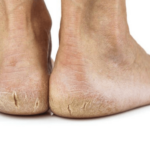
![Bruise Itches [Causes and Treatments for an Itchy Bruise] bruise itches](https://skincaregeeks.com/wp-content/uploads/2021/04/bruise-itches-150x150.jpg)
